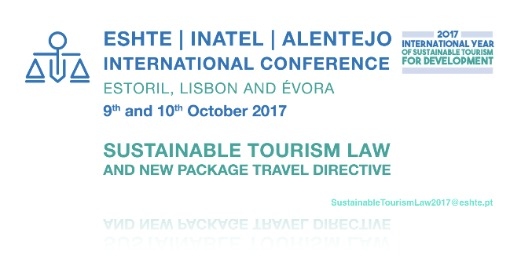SUSTAINABLE TOURISM LAW AND NEW PACKAGE TRAVEL DIRECTIVE

International conference focused on the hard-soft law associated with sustainable tourism, will bring together, on the 9th and 10th October 2017, a group of around thirty world-wide specialists, as a result of ESHTE and the INATEL foundation, addressing the theme of Sustainable Tourism Law.
There will also be a publication in a format of great editorial dignity, bringing together a large number of specialists who intend it to be a reference in the area.
The various legislative instruments for sustainable tourism, such as the Manila Declaration on World Tourism (1980), the Charter for Sustainable Tourism (Lanzarote, 1995), the Agenda 21 for the Travel and Tourism Industry (joint publication , in 1993 by the WTTC, UNWTO and the Earth Council, adapting to the sector the extensive and complex Agenda 21 that had been approved the previous year at the Earth Summit held in Rio de Janeiro), the World Code of Ethics for Tourism (1999), the World Charter for Sustainable Tourism + 20 (2015), and the draft UNWTO Convention for the Protection of Tourists and the Rights and Obligations of Service Providers which is likely to be adopted at the 22nd UNWTO to be held in China in September this year.
Planning is inseparable from sustainable tourism, and instruments such as the capacity of loading / limits of acceptable change, tourist districts, zoning or the declaration of saturated tourist areas will be considered. Another high-profile figure will be the moratorium on certain activities, not licensing new companies / projects in a given time period, highlighting hotel moratoria (Seychelles, USA, Barcelona) due to capacity or typology but projecting in other areas Fishing moratorium area). Taxation and quality, other key aspects of sustainable tourism, will also be analyzed.
The new European discipline of package travel and related travel services (Directive 2015/2302) will also receive some attention, with the launch of the 600-page book on contributions from the previous year and others Joined Vincenzo Franceschelli and Francesco Morandi, authors of the classic Manuale di Diritto del Turismo, are the first two of the thirty or so authors – among them Melgosa Arcos, Laurence Jégouzo, Antonia Paniza, Silvia Feliu and Ernst Führich representing large universities (Salamanca, Sorbonne, Baleares or Kempten), or prominent legal scholars of reference works of Tourism Law as Sarah Prager, Stephen Mason or Marc McDonald – of the book entitled New Package Travel Directive, also under the aegis of ESHTE | INATEL, published in English. In addition to some interventions on this important regime that will have to be transposed into the legislation of the Member States by 1 January 2018 and implemented from 1 July there will also be a panel in which experts will identify the main issues that have been raised Countries.
In Portuguese
Conferência internacional focada nas normas (hard | soft law) associadas ao turismo sustentável, vai reunir à semelhança do ano anterior, sob a égide da ESHTE e da fundação INATEL, em 9 e 10 Outubro de 2017, um conjunto de cerca de trinta especialistas mundiais versando a temática da Sustainable Tourism Law.
Haverá também uma publicação num formato de grande dignidade editorial, congregando um elevado número de especialistas que se pretende constituir uma referência na área.
Vão analisar-se os diferentes instrumentos legislativos do turismo sustentável, designadamente a Declaração de Manila sobre o Turismo Mundial (1980), a Carta para o Turismo Sustentável (Lanzarote, 1995), a Agenda 21 para a Indústria de Viagens e Turismo (publicação conjunta, em 1993, pelo WTTC, OMT e pelo Conselho da Terra, adaptando ao sector a extensa e complexa Agenda 21 que havia sido aprovada, no ano anterior, na Cimeira da Terra, realizada no Rio de Janeiro), o Código Mundial de Ética para o Turismo (1999), a Carta Mundial para o Turismo Sustentável + 20 (2015) e o projecto de Convenção da OMT para a protecção dos turistas e dos direitos e obrigações dos prestadores de serviços que ao que tudo indica será aprovada na 22ª Assembleia Geral da OMT que se realizará na China, em Setembro deste ano.
O planeamento é indissociável do turismo sustentável pelo que se abordarão instrumentos como a capacidade de carga / limits of acceptable change, municípios turísticos, zoneamento ou a declaração de zona turística saturada. Outra figura de grande actualidade será a moratória de certas actividades não licenciando novas empresas/projectos num determinado período temporal, destacando-se as moratórias hoteleiras (Seicheles, EUA, Barcelona) em razão da capacidade ou da tipologia mas projectando-se noutras áreas (special fishing moratorium area). A fiscalidade e a qualidade, outras das traves mestras do turismo sustentável, serão também objecto de análise.
A nova disciplina europeia das viagens organizadas e serviços de viagens conexos (Directiva 2015/2302) também será objecto de alguma atenção, tendo como ponto alto o lançamento do livro com cerca de 600 páginas relativo às contribuições do ano anterior e de outras que entretanto se juntaram. Vincenzo Franceschelli e Francesco Morandi, autores do clássico Manuale di Diritto del Turismo, são os primeiros dois dos cerca de trinta autores – dentre os quais Melgosa Arcos, Laurence Jégouzo, Antonia Paniza, Silvia Feliu ou Ernst Führich representando grandes universidades (Salamanca, Sorbonne, Baleares ou Kempten), ou destacados juristas autores de obras de referência da Tourism Law como Sarah Prager, Stephen Mason ou Marc McDonald – do livro intitulado New Package Travel Directive, também ele sob a égide da ESHTE| INATEL, publicado em língua inglesa. Para além de algumas intervenções sobre este importante regime que terá de ser transposto para a legislação dos Estados membros até 1 de Janeiro de 2018 e aplicado partir de 1 de Julho haverá também um painel em que os especialistas identificarão as principais questões que se têm sido suscitadas nos respectivos países.
IY 2017 Travel.Enjoy.Respect. (Vídeo)
Email: sustainabletourismlaw2017@eshte.pt
-
http://www.turisver.com/eshte-inatel-alentejo-international-conference/
-
2ª Conferência Anual ESHTE, INATEL e Turismo do Alentejo a 9 e 10 de Outubro | Turisver (11/09/2017)
-
Conferência internacional debate normas associadas ao Turismo Sustentável









